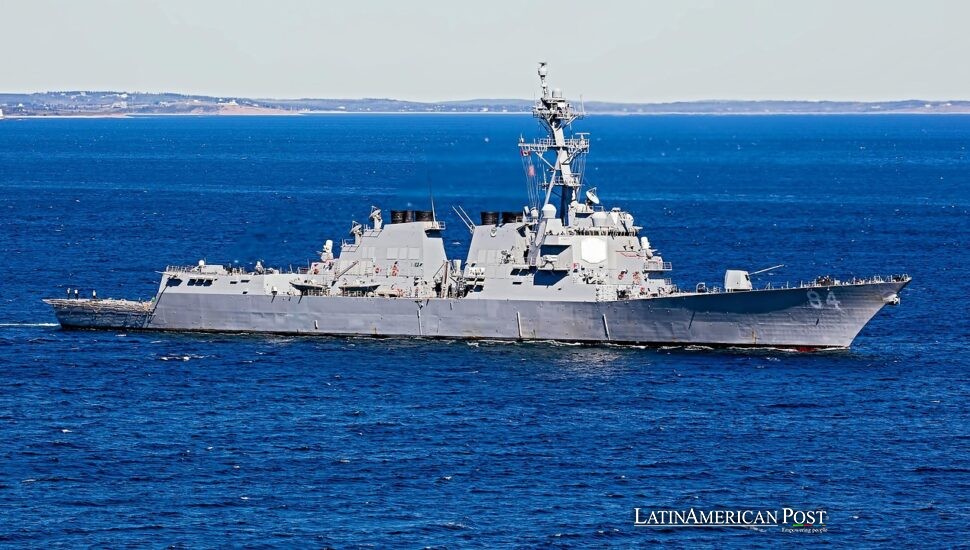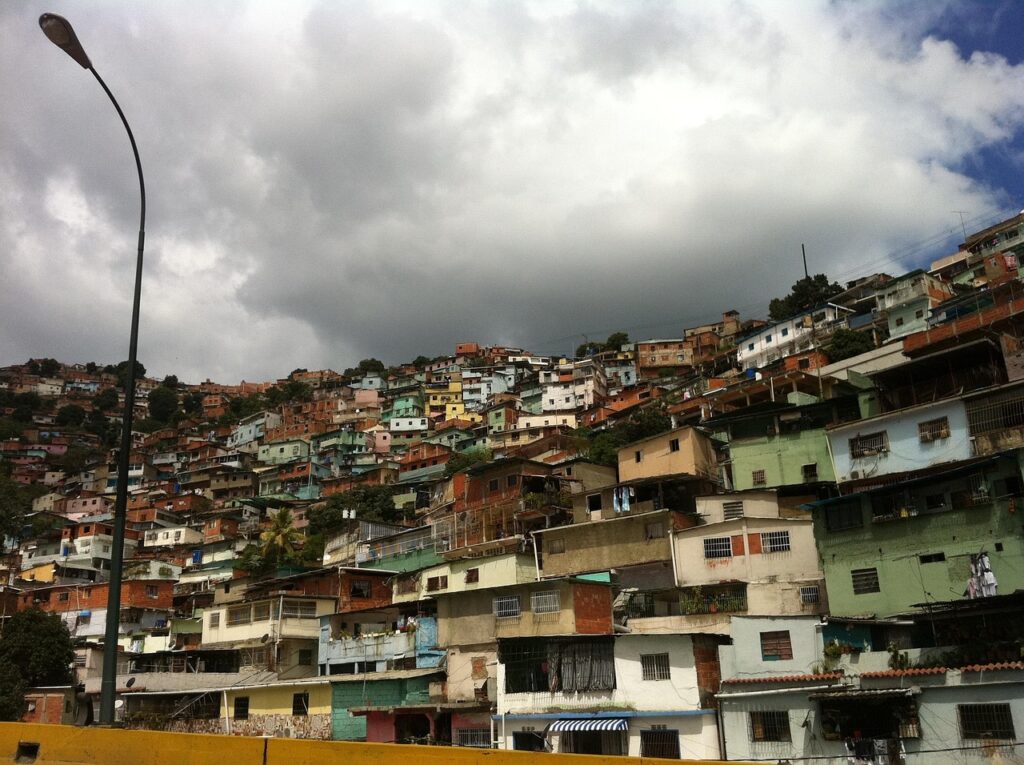Venezuela on Edge: Warships, Empty Wallets, and a Nation Running on Nerves

Gunboats circle the coastline. Missiles rise on television. But the loudest signal inside Venezuela is smaller and closer: the growl of empty stomachs. As Washington flexes and Caracas mobilizes, fear of war competes with the fear of tomorrow’s grocery bill. “Yes, I worry” about a U.S. attack, a young cook from Sucre told The Washington Post. “But we cannot think about anything else without buying food first.” The whisper of conditional anonymity—granted out of fear—speaks as loudly as his words.
Gunboats Offshore, Breadlines at Home
Two months into the most significant U.S. military presence off South America in decades, explosions at sea punctuate the news. U.S. forces have been blowing up boats off Venezuela’s coast; Donald Trump has warned that “land is going to be next.” Caracas answers with choreography—troops to borders, anti-aircraft batteries standing tall, civilians urged to “prepare.” Yet the streets do not flood with stockpilers. Not because nerves are calm, but because wallets are thin. “Right now, nobody has enough to really stock up on anything,” said David Smilde, a Tulane University sociologist who follows Venezuela, speaking to The Washington Post. “People are hurting economically.” You can’t hoard if you can’t buy.
The contradictions multiply. Holiday lights blink in the capital while arrests of economists and consultants—at least eight this year—narrow the public’s field of vision just when clarity matters. Among those detained was Rodrigo Cabezas, a former Chávez finance minister. The lesson is brutal: in today’s Venezuela, even counting can be a crime.
Inflation, Poverty, and the Politics of Numbers
The IMF projects inflation near 270 percent by year’s end, with worse ahead. Hyperinflation is a slow theft: it steals most from those furthest from dollars and leverage. The government denies the risk and blames sanctions. Sanctions do hurt—credit tightens, investors vanish, trade snarls—but the deeper wound was self-inflicted: years of mismanagement and corruption that hollowed the state’s ability to keep lights on and shelves full. A brief opening in 2021, as price and currency controls eased, let dollars breathe into the economy. Supermarkets refilled. Car lots reopened. Then the window slammed. Growth slipped, underemployment spread, purchasing power withered.
By 2024, researchers at the Catholic University of Venezuela estimated that seven in ten households were in poverty. Hunger is visible on the sidewalks—families asking strangers for lunch. The financial panic is quieter: a rush to dollars that undercuts the bolívar by the hour. “People’s expectations have caused the demand for dollars in the foreign exchange market to increase,” a Venezuelan economist told The Washington Post, requesting anonymity for safety. “Household incomes are suffering a devastating blow. People can buy less and less.” Expectations of conflict push up dollar demand, which pushes down the currency, which pushes up prices—the cycle spins people out of the job market altogether. “The recession is taking people out of the job market,” the economist said. “Poverty is increasing.”
Seven million Venezuelans have already left. They fled not just persecution but a paycheck that shrank by lunchtime, clinics without medicine, taps that ran dry. Every offshore detonation ripples inland across a population already living under a different kind of siege: permanent scarcity.

Security Theater Meets an Exhausted Society
Authoritarian survival depends on fog—noise that keeps citizens balancing on their heels. Facing U.S. ships and presidential threats, Nicolás Maduro reached for familiar levers. Troops to the Colombian border. Calls for “self-defense militias.” A new app to report “everything they see and hear.” A request to the Supreme Court to devise a way to strip Venezuelans of citizenship if they advocate foreign intervention—aimed, Vice President Delcy Rodríguez suggested, at opposition leader Leopoldo López, who answered from Madrid: “Maduro wants to take away my citizenship for saying what all Venezuelans think and want: freedom,” he told reporters, as quoted by The Washington Post.
International pressure has been building for years. Washington withdrew recognition in 2019; a U.S. grand jury later indicted Maduro and allies on narcoterrorism charges; this year, the reward for his capture rose to $50 million. He still holds the tools: key military units, armed collectives, and the security services’ handcuffs. But his tone shifted. “Please, please, please … no crazy war … peace forever!” he pleaded—in English—last week.
Inside homes, the words are different—lower, wearier, angrier. “I don’t know what’s going to happen,” a Caracas schoolteacher told The Washington Post, asking for anonymity. “The economy is so bad, the situation is so difficult, that if something is going to happen, I hope it happens fast. We cannot live like this anymore.” That quiet desperation captures the cost of endless brinkmanship. Deterrence at sea has a land price: it deters investment, hiring, planning—tomorrow itself.
A Narrower Path Than Bluster and Blockades
There are no clean hands. Washington overshoots with sanctions and theatrical force. Caracas centralizes power, criminalizes expertise, and monetizes scarcity. Both make ordinary Venezuelans pay. If the United States believes the largest maritime posture in decades will choke narcotrafficking, it should show its math; killing couriers in fast boats has never broken networks that flow through ports, banks, and politicians. If Caracas believes apps and anti-air systems restore confidence, it should explain why those tools have never fixed blackouts or stocked pharmacies.
There is a smaller, smarter route. First, the firewall provides humanitarian relief from geopolitics. A country where 70 percent of households are poor cannot absorb shocks. Stand-up monitored channels—food, medical imports, fuel for clinics—administered by the U.N. and vetted NGOs with audit trails. The U.S. and Europe can pair reversible sanctions relief to verifiable steps: access for convoys, release of detainees, and credible electoral guarantees. Caracas should accept independent monitoring and stop arresting the very people who generate the data needed to govern.
Second, restore deterrence to a recognizable shape. Task forces are blunt. If the aim is interdiction, invest in financial targeting, maritime domain awareness, and partner capacity—not headline explosions that fortify hardliners and spook markets where a loaf of bread already costs more by nightfall.
Third, let Venezuelans decide their future. That requires oxygen: stop criminalizing inflation data, stop threatening citizenship for speech, open space for observation and competition that are more than ritual. If Maduro is confident in his mandates, he should welcome measurement. If the opposition wants change, it needs an offramp, not just pressure.
Finally, listen to the quiet voices—the cook from Sucre, the teacher in Caracas—speaking to The Washington Post on the condition of anonymity, both asking to survive the week. When U.S. officials hint that “land is going to be next,” and Venezuelan officials counter with militias and apps, those voices shrink further. Their needs are simple and radical: stable prices, medicine, safe streets, a currency you can plan around, a politics you don’t have to whisper about. None will arrive by spectacle at sea. The most destabilizing weapon in this standoff isn’t a destroyer or an S-300 battery. It’s uncertainty—the daily variety that empties savings, arrests economists, and pushes families toward the border. If Washington wants to constrain Maduro, it should avoid moves that feed his siege narrative and focus on empowering Venezuelans’ ability to choose. If Maduro wants to constrain Washington, stop handing it ammunition and start delivering measurable relief. The alternative is a stalemate with a body count—boats destroyed offshore, meals skipped onshore. That isn’t a strategy. It’s abdication.





